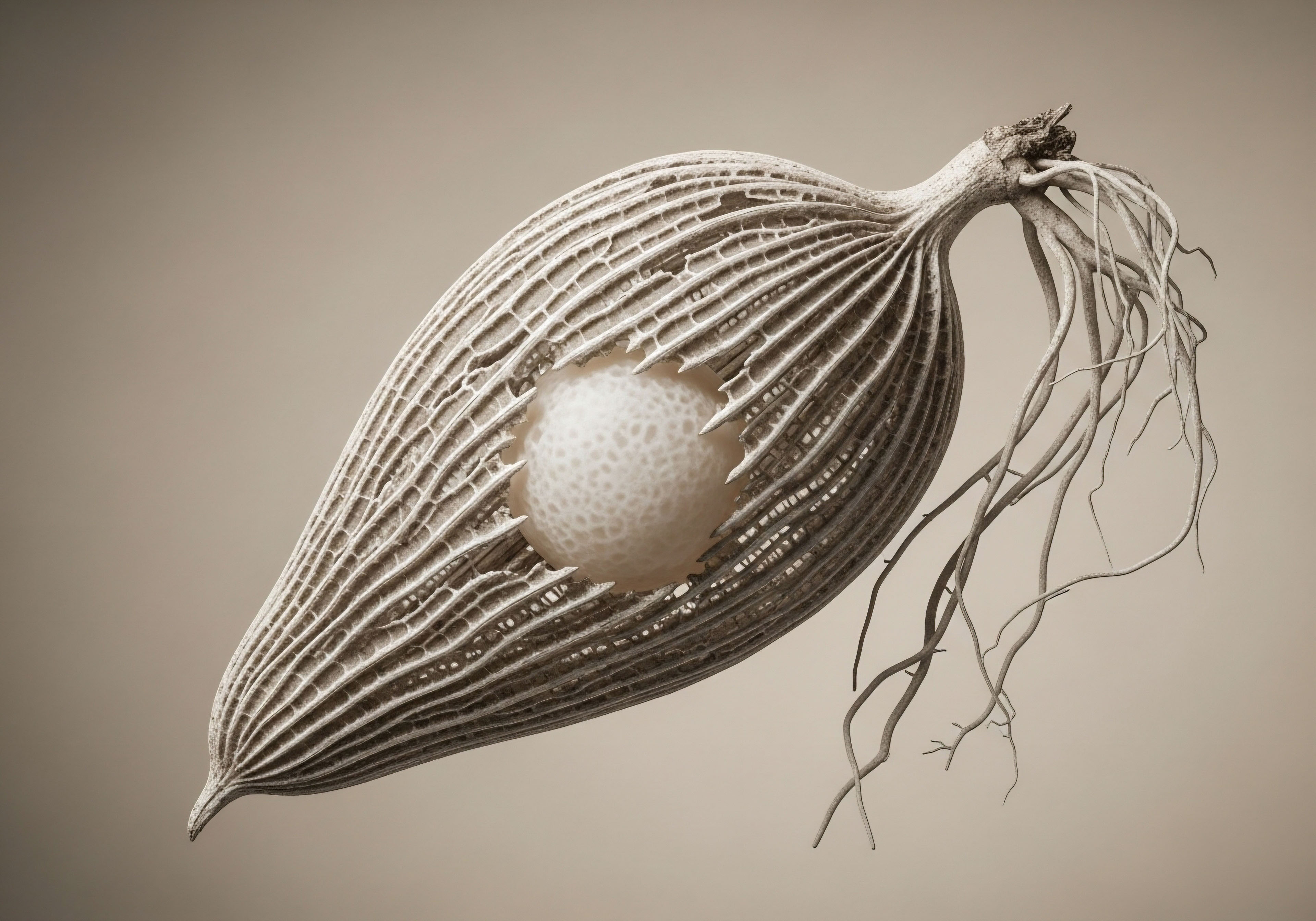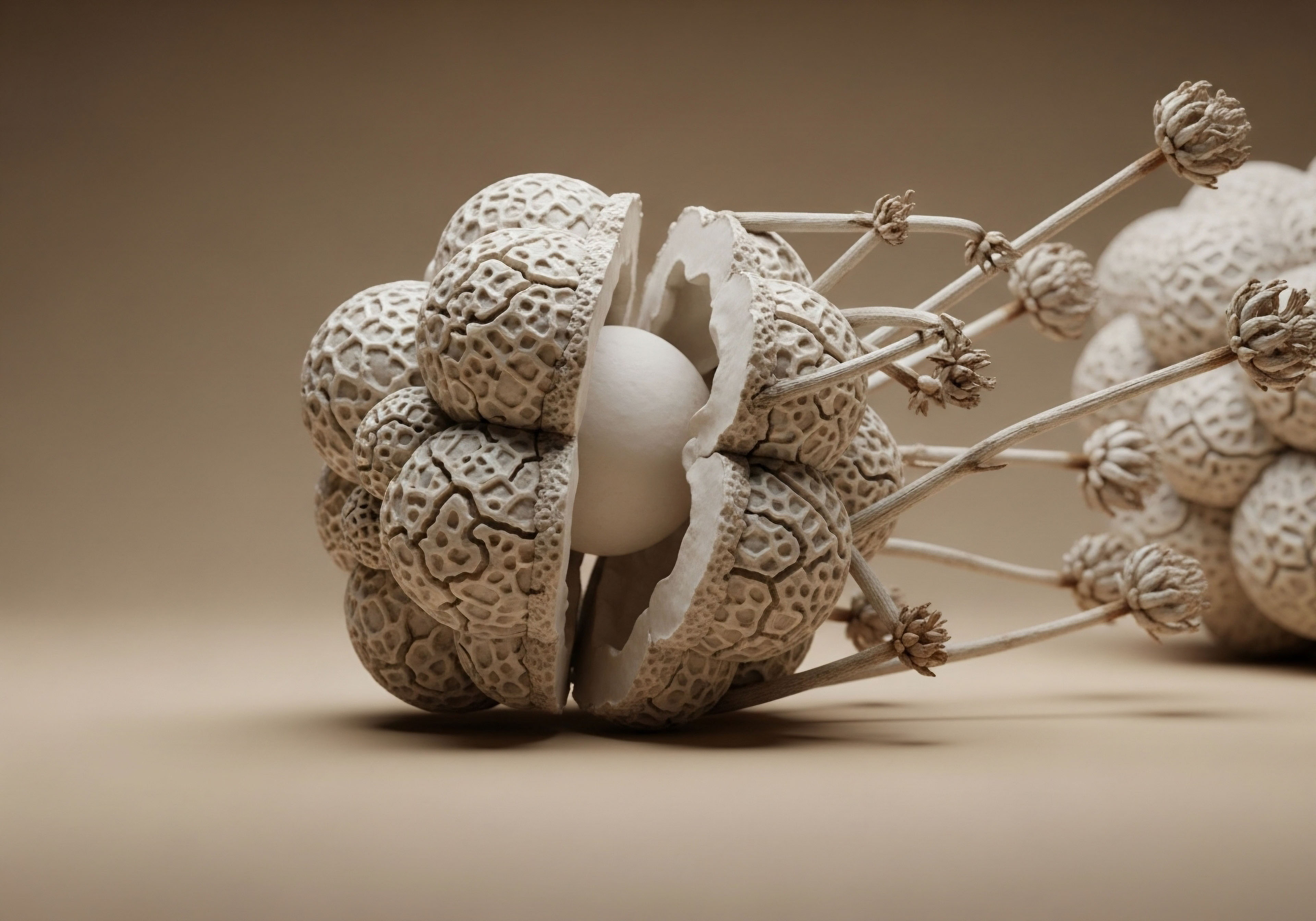

Fundamentals
You feel it in your bones, a deep sense of fatigue that sleep does not seem to touch. You might notice your skin is drier, your hair is thinning, or your thoughts are moving through a fog that is difficult to penetrate. These experiences are valid, and they are signals from your body’s intricate communication network.
When you receive a diagnosis involving elevated thyroid autoantibodies, such as in Hashimoto’s thyroiditis, you are holding a piece of data that gives a name to this experience. It confirms that your immune system, the body’s dedicated protector, has begun to misidentify your own thyroid tissue as a foreign threat.
The question of whether lifestyle changes alone can be enough to lower these autoantibodies is the beginning of a personal scientific journey into the systems that govern your well-being.
The presence of thyroid autoantibodies, specifically Thyroid Peroxidase (TPO) antibodies and Thyroglobulin (Tg) antibodies, signifies an active autoimmune process. TPO is a critical enzyme the thyroid gland uses to produce its essential hormones, which regulate the metabolic rate of every cell in your body.
Thyroglobulin is a protein that serves as the scaffolding upon which thyroid hormones are built. When the immune system creates antibodies against these vital components, it is akin to a security system mistakenly targeting the factory workers and the assembly line of a critical manufacturing plant.
The result is a disruption in hormone production, leading to the symptoms you feel, and chronic inflammation within the gland itself. Lowering these antibodies is a primary objective because it indicates a calming of this internal conflict. It is a measurable sign that the immune system is reducing its assault on the thyroid.
Understanding thyroid autoantibodies is the first step in decoding the immune system’s misdirected signals and addressing the root of thyroid dysfunction.
The journey to quieting this autoimmune response begins with understanding its origins. The immune system’s confusion is rarely spontaneous. It is often a response to a combination of genetic predisposition and environmental or internal triggers. These triggers are the focal point of lifestyle interventions.
They are the elements within your control that can either promote or quell the inflammatory signals that drive autoimmunity. Consider the gut, which houses approximately 70-80% of your body’s immune cells. Its lining is a delicate, single-cell-thick barrier designed to absorb nutrients while keeping out undigested food particles, toxins, and pathogens.
When this barrier becomes compromised, a condition known as increased intestinal permeability, these substances can enter the bloodstream, provoking a strong immune reaction. This systemic inflammation can contribute to the development and exacerbation of autoimmune conditions like Hashimoto’s. Lifestyle factors, particularly diet, have a direct and profound impact on the integrity of this barrier.

What Is the Role of the Thyroid Gland?
The thyroid gland is a central regulator of the body’s energy economy. Located at the base of your neck, this butterfly-shaped gland produces two primary hormones, thyroxine (T4) and triiodothyronine (T3). These hormones travel through the bloodstream to every tissue, instructing cells on how fast to work and use energy.
This function influences nearly every aspect of your physiology, from your heart rate and body temperature to your cognitive function and mood. The thyroid operates within a sophisticated feedback loop known as the Hypothalamic-Pituitary-Thyroid (HPT) axis. The hypothalamus in the brain releases Thyrotropin-Releasing Hormone (TRH), which signals the pituitary gland to release Thyroid-Stimulating Hormone (TSH).
TSH, in turn, tells the thyroid how much T4 and T3 to produce. When the immune system attacks the thyroid, this finely tuned system is disrupted, impacting the body’s entire operational efficiency.

Understanding Autoimmunity
Autoimmunity is a condition of a highly intelligent and active immune system that has lost its ability to distinguish between “self” and “non-self.” This loss of tolerance leads the immune system to produce autoantibodies that target the body’s own tissues.
In the context of Hashimoto’s thyroiditis, the immune system is responding to what it perceives as a threat located within the thyroid gland. The goal of intervention is to identify and remove the triggers that are perpetuating this state of high alert.
By doing so, it is possible to modulate the immune response, reduce the production of autoantibodies, and preserve thyroid function. This process involves a systematic approach to identifying personal triggers, which can vary significantly from one individual to another. These triggers often fall into several key categories:
- Dietary Components ∞ Certain foods, such as gluten and processed dairy, can provoke an inflammatory response in susceptible individuals.
- Nutrient Deficiencies ∞ Key nutrients like selenium, vitamin D, and zinc are essential for both healthy thyroid function and a balanced immune response.
- Chronic Stress ∞ The persistent output of stress hormones, particularly cortisol, can dysregulate immune function and worsen autoimmunity.
- Environmental Toxins ∞ Exposure to endocrine-disrupting chemicals found in plastics, pesticides, and household products can interfere with thyroid function and stimulate the immune system.
Addressing these areas through targeted lifestyle modifications forms the foundation of a strategy aimed at reducing the autoimmune burden. This approach seeks to create an internal environment that supports immune tolerance and allows the body’s systems to return to a state of balance. It is a proactive process of reclaiming physiological harmony by systematically removing sources of inflammation and providing the necessary resources for healing and regulation.


Intermediate
Moving from the foundational knowledge of what thyroid autoantibodies are, we can now examine the specific, actionable protocols that can lead to their reduction. This is where the science of lifestyle intervention becomes a clinical tool. The core principle is immunomodulation, the process of recalibrating the immune system’s activity.
We achieve this by systematically addressing the primary inputs that influence its behavior ∞ the food you consume, the nutrients you absorb, the stress you manage, and the rest you obtain. These are not passive activities; they are direct communications with your body’s regulatory systems.
While medication like levothyroxine replaces the hormone that a damaged thyroid can no longer produce, lifestyle interventions aim to reduce the ongoing damage by pacifying the autoimmune attack. Many individuals find that a combination of both approaches yields the most significant improvement in both lab markers and quality of life.

Dietary Protocols for Immune Recalibration
Diet is a powerful lever for influencing inflammation and autoimmunity. Several structured dietary approaches have been studied and anecdotally reported to be effective in reducing thyroid autoantibodies. Their common thread is the removal of common inflammatory triggers and an emphasis on nutrient-dense, whole foods.

The Gluten-Free Protocol
One of the most discussed dietary interventions for Hashimoto’s is the strict elimination of gluten, a protein found in wheat, barley, and rye. The connection is rooted in a concept called molecular mimicry. The protein structure of gluten, specifically gliadin, bears a striking resemblance to that of thyroid tissue.
In individuals with a genetic predisposition and increased intestinal permeability, the immune system mounts an attack on gliadin. Because of the structural similarity, the immune cells may then mistakenly target the thyroid gland as well. A 2018 pilot study published in the journal Experimental and Clinical Endocrinology & Diabetes demonstrated this principle.
In the study, women with Hashimoto’s who followed a gluten-free diet for six months showed a significant reduction in their levels of both TPO and Tg antibodies compared to a control group. This suggests that for a subset of individuals, removing gluten can be a critical step in calming the autoimmune response.

The Autoimmune Protocol (AIP)
The Autoimmune Protocol, or AIP, is a more comprehensive elimination diet designed for autoimmune conditions. It extends the gluten-free approach by also temporarily removing other foods that can be problematic for some individuals, such as dairy, eggs, nuts, seeds, nightshade vegetables (tomatoes, peppers, eggplant), and legumes.
The goal of the AIP is to remove as many potential sources of inflammation as possible to allow the gut lining to heal and the immune system to calm down. After a strict elimination phase, foods are systematically reintroduced one by one to identify specific, personal triggers. A 2017 study with women with Hashimoto’s following the AIP diet showed significant improvements in quality of life scores and a decrease in the inflammatory marker C-reactive protein (CRP).
Targeted dietary protocols work by removing specific molecular triggers that can confuse the immune system and perpetuate the autoimmune cycle.
The table below compares these dietary frameworks, highlighting their primary focus and mechanisms of action. It is a tool for understanding the different levels of intervention available, from a targeted removal of a single protein complex to a broad-spectrum approach to gut healing.
| Dietary Protocol | Primary Focus | Key Mechanisms of Action | Foods to Remove |
|---|---|---|---|
| Gluten-Free Diet | Elimination of gluten-containing grains. | Reduces potential for molecular mimicry between gliadin and thyroid tissue. May decrease intestinal inflammation. | Wheat, barley, rye, and their derivatives. |
| Autoimmune Protocol (AIP) | Elimination of all potential inflammatory and immunogenic foods. | Maximizes gut healing by removing a wide range of potential irritants. Calms systemic inflammation. | Grains, legumes, dairy, eggs, nuts, seeds, nightshades, processed sugars, oils, and food additives. |
| Anti-Inflammatory Diet | Emphasis on whole foods rich in phytonutrients and healthy fats. | Modulates inflammatory pathways through high intake of antioxidants and omega-3 fatty acids. | Processed foods, refined sugars, trans fats, and excessive omega-6 fats. |

Nutrient Cofactors for Thyroid and Immune Health
Beyond the removal of problematic foods, the addition of specific nutrients is equally important. Certain vitamins and minerals act as essential cofactors for both the production of thyroid hormones and the regulation of the immune system. Deficiencies in these key areas are common in individuals with Hashimoto’s and can hinder progress.
- Selenium ∞ This trace mineral is a critical component of the enzyme glutathione peroxidase, which protects the thyroid gland from oxidative stress generated during hormone synthesis. Selenium is also required to convert the inactive T4 hormone into the active T3 form. Studies have shown that selenium supplementation (typically around 200 mcg/day) can significantly reduce TPO antibody levels. Brazil nuts are an excellent food source.
- Vitamin D ∞ Known as the “sunshine vitamin,” Vitamin D functions more like a hormone in the body and is a potent modulator of the immune system. It helps to promote a state of immune tolerance. Many people with autoimmune conditions have suboptimal or deficient levels of Vitamin D. Research has suggested that supplementation can help lower thyroid antibody levels.
- Zinc ∞ This mineral is involved in over 300 enzymatic reactions in the body, including the synthesis of thyroid hormones. Zinc is also crucial for maintaining a healthy immune response.

The Stress-Hormone Connection
Chronic stress is a powerful driver of autoimmune disease. The continuous activation of the body’s stress response system, the Hypothalamic-Pituitary-Adrenal (HPA) axis, leads to elevated levels of the hormone cortisol. While cortisol has anti-inflammatory properties in the short term, chronically high levels lead to immune dysregulation.
Specifically, elevated cortisol can suppress the activity of certain immune cells while making others more aggressive. It also inhibits the conversion of T4 to the active T3, worsening hypothyroid symptoms. Therefore, implementing consistent stress management practices is a non-negotiable part of any protocol to lower autoantibodies. Techniques like meditation, deep breathing exercises, yoga, and spending time in nature can help to downregulate the HPA axis, reduce cortisol output, and support a more balanced immune state.


Academic
A sophisticated understanding of thyroid autoimmunity requires a systems-biology perspective, viewing the condition as an emergent property of interconnected physiological networks. The focus shifts from a single malfunctioning gland to the complex interplay between the gut microbiome, the immune system, and the entire endocrine apparatus, including the gonadal and adrenal axes.
The question of whether lifestyle changes can significantly lower autoantibodies is answered by examining how these deep interventions fundamentally alter the signaling environment of the body. The reduction in autoantibodies is a biomarker reflecting a systemic shift away from a pro-inflammatory, autoimmune-permissive state toward one of immune tolerance and homeostasis.

The Gut-Thyroid Axis a Molecular Perspective
The link between intestinal health and thyroid autoimmunity is one of the most well-documented in the scientific literature. The central mechanism is the loss of intestinal barrier integrity, colloquially known as “leaky gut.” From a molecular standpoint, this involves the loosening of the tight junctions between intestinal epithelial cells, which are protein structures that regulate paracellular transport.
This process is heavily influenced by a protein called zonulin, which is upregulated by factors like gliadin (the protein in gluten) and gut dysbiosis.
When the barrier is compromised, lipopolysaccharide (LPS), a component of the cell wall of gram-negative bacteria, can translocate from the gut lumen into systemic circulation. This event, known as metabolic endotoxemia, is a potent trigger of the innate immune system via Toll-like receptor 4 (TLR4) signaling.
This activation results in the production of pro-inflammatory cytokines like TNF-α and IL-6, creating a state of chronic, low-grade systemic inflammation that is a key prerequisite for the loss of self-tolerance seen in autoimmunity. A 2019 study in Frontiers in Endocrinology highlights the intricate connections between gut dysbiosis, LPS, and the pathogenesis of autoimmune thyroid diseases.
Therefore, lifestyle interventions such as a gluten-free or AIP diet are effective because they directly reduce the triggers (like gliadin) that increase zonulin and promote intestinal permeability, thereby decreasing the inflammatory load from LPS translocation.
Systemic inflammation originating from a compromised gut barrier is a primary upstream driver of the autoimmune process against the thyroid.

How Does Hormonal Balance Influence Autoimmunity?
The endocrine system is a deeply interconnected web of signaling molecules. The function of the thyroid gland does not occur in isolation; it is influenced by and, in turn, influences the status of sex hormones and adrenal hormones. This crosstalk has significant implications for autoimmunity, as sex hormones are known to be powerful modulators of the immune response.
Estrogen, for example, tends to have a pro-inflammatory and immune-stimulating effect, which may help explain why autoimmune diseases are significantly more prevalent in women. Testosterone, conversely, generally exhibits immunosuppressive and anti-inflammatory properties. The balance between these hormones can shift the immune system toward or away from an autoimmune posture.
This is where a holistic view that includes the core clinical pillars of hormonal optimization becomes relevant. For a man with Hashimoto’s and concurrent low testosterone (hypogonadism), a properly managed Testosterone Replacement Therapy (TRT) protocol could contribute to a reduction in systemic inflammation.
By restoring testosterone to optimal physiological levels, the anti-inflammatory and immunosuppressive effects of the hormone can help to create an internal environment less conducive to autoimmune activity. This is a supportive, systemic intervention that complements the direct approaches of diet and nutrient repletion.
Similarly, for a peri-menopausal woman experiencing fluctuations in estrogen and progesterone, restoring balance can be a key part of a comprehensive strategy. The use of bioidentical progesterone, which has calming and immunomodulatory effects, can help to counteract the potentially pro-inflammatory effects of unopposed or fluctuating estrogen. The goal is to stabilize the entire endocrine system, reducing the overall inflammatory burden and removing potential triggers for immune dysregulation. The table below outlines some of these hormonal interconnections.
| Hormone System | Key Hormones | Influence on Immune Function | Implication for Thyroid Autoimmunity |
|---|---|---|---|
| Gonadal Axis (Male) | Testosterone | Generally anti-inflammatory and immunosuppressive. | Low testosterone may contribute to a pro-inflammatory state, potentially exacerbating autoimmunity. Optimization may be a supportive strategy. |
| Gonadal Axis (Female) | Estrogen, Progesterone | Estrogen can be immune-stimulating; Progesterone can be immunomodulatory. | Imbalances, particularly estrogen dominance, may worsen autoimmune activity. Hormonal balancing can be a key supportive measure. |
| Adrenal Axis (HPA) | Cortisol, DHEA | Chronic high cortisol dysregulates the immune system. DHEA can buffer some of cortisol’s effects. | HPA axis dysfunction is a direct driver of immune imbalance and worsens T4 to T3 conversion. Management is critical. |

The Role of Advanced Therapeutic Peptides
In academic and forward-thinking clinical circles, the use of specific peptide therapies is being explored for their potential to modulate the upstream drivers of autoimmunity. Peptides are short chains of amino acids that act as precise signaling molecules. While not a direct treatment for Hashimoto’s, certain peptides may support the foundational lifestyle changes being made. For example:
- BPC-157 (Body Protective Compound-157) ∞ This peptide has demonstrated significant gut-healing properties in preclinical studies. Its ability to promote tissue repair and strengthen the intestinal barrier could theoretically help to reduce the translocation of inflammatory molecules like LPS, addressing a root cause of systemic inflammation.
- Thymosin Alpha-1 ∞ This peptide is known to be a powerful modulator of the immune system, helping to balance the Th1 and Th2 arms of the adaptive immune response, which are often imbalanced in autoimmune conditions.
- CJC-1295 / Ipamorelin ∞ This combination stimulates the body’s own production of growth hormone. Growth hormone has complex effects on the immune system and metabolism, and restoring its youthful rhythm can be part of a larger strategy to improve systemic health and resilience.
These peptide therapies represent a frontier in personalized medicine. Their application in the context of thyroid autoimmunity would be as a synergistic tool, used to accelerate the healing of systems like the gut that are being addressed through diet and lifestyle.
Their use underscores the core concept of this academic approach ∞ that significant reduction of thyroid autoantibodies is achieved by a multi-faceted, systems-level intervention that restores the integrity of the body’s barriers, balances its intricate hormonal symphony, and quells the fires of systemic inflammation.

References
- Krysiak, Robert, Witold Szkróbka, and Bogusław Okopień. “The Effect of Gluten-Free Diet on Thyroid Autoimmunity in Drug-Naïve Women with Hashimoto’s Thyroiditis ∞ A Pilot Study.” Experimental and Clinical Endocrinology & Diabetes, vol. 127, no. 7, 2019, pp. 417-422.
- Liontiris, Michael I. and Elias E. Mazokopakis. “A concise review of Hashimoto’s thyroiditis (HT) and the importance of iodine, selenium, vitamin D and gluten on the autoimmunity and dietary management of HT patients.” Hell J Nucl Med, vol. 20, no. 1, 2017, pp. 51-56.
- Abbott, R. D. Skele, K. & Mbus, J. (2017). Efficacy of the Autoimmune Protocol Diet for Hashimoto’s Thyroiditis. Journal of the American College of Nutrition, 36(6), 481-482.
- Wentz, Izabella, and Marta Nowosadzka. Hashimoto’s Thyroiditis ∞ Lifestyle Interventions for Finding and Treating the Root Cause. Morgan James Publishing, 2013.
- Pobłocki, Jakub, et al. “Whether a Gluten-Free Diet Should Be Recommended in Chronic Autoimmune Thyroiditis or Not? ∞ A 12-Month Follow-Up.” Journal of Clinical Medicine, vol. 10, no. 15, 2021, p. 3240.

Reflection

Charting Your Own Biological Map
The information presented here provides a clinical framework, a map built from scientific data and physiological principles. Yet, the territory it describes is uniquely your own. The path to lowering thyroid autoantibodies and reclaiming a state of vitality is one of personal scientific discovery.
The numbers on your lab reports are valuable data points, but they are only part of the story. The other part is written in the language of your own lived experience, your energy levels, your cognitive clarity, and your overall sense of well-being.
Consider this knowledge not as a rigid set of rules, but as a set of tools and a lens through which to view your body’s signals with greater clarity. What are the specific inputs that seem to disrupt your internal equilibrium? What practices and nutrients bring about a sense of calm and stability?
This journey requires patience, self-compassion, and a partnership with a knowledgeable practitioner who can help you interpret your body’s unique responses. You are the lead investigator in the most important study you will ever conduct, the study of you. The potential for profound change lies within the daily choices you make to support and recalibrate your own biology.

Glossary

thyroid autoantibodies

immune system

lifestyle changes

thyroid gland

lifestyle interventions

intestinal permeability

autoimmune conditions

immune response

vitamin d

molecular mimicry

gluten-free diet

autoimmune protocol

selenium supplementation

hpa axis

thyroid autoimmunity

systemic inflammation

endocrine system




